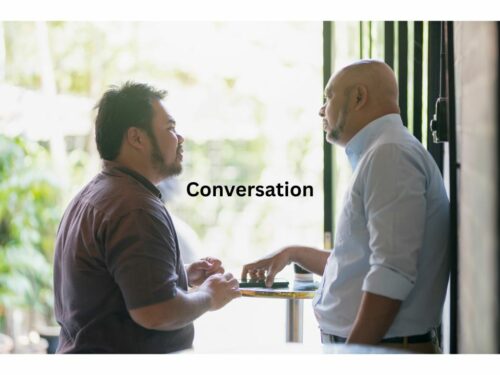Basic conversation skills are foundational for anyone learning English, especially if you’re starting out. Think of it as building blocks that will help you feel more comfortable as you progress.

This guide is tailored specifically for adult ESL learners, aiming to give you a strong foothold in starting and maintaining conversations. We’ll cover everything from common greetings to simple questions. Whether you’re at a social gathering or navigating through your daily life, knowing these basics will be super helpful.
Here’s a sneak peek into what we’ll dive into: first, you’ll get familiar with common greetings and simple phrases. Then, we’ll explore how to ask and answer simple questions. Finally, I’ll provide practical ways for you to practice these conversation skills effectively.
Use this guide as a resource for practice. Try out the examples and ideas it offers. Don’t stress about perfection. The goal is to get talking and build your confidence step by step. Ready to get started? Let’s go.
Common Greetings and Simple Phrases
Mastering greetings and simple phrases is like having the key to open countless doors. These basics will help you navigate everyday interactions with ease.

Let’s start with greetings. Knowing how to greet someone sets a positive tone for any interaction. Here are a few essential ones:
– Hi or Hello – Great for any informal situation. Just a simple Hello can go a long way.
– Good morning/afternoon/evening – Use these in more formal settings. They show a bit more respect and awareness of the time of day.
– How are you? – A polite way to ask about someone’s well-being. You can respond with something like, “I’m good, thanks” or “I’m okay, how about you?”
Now, onto some simple phrases that will come in handy during daily conversations:
– Please and Thank you – These are magic words. Use please when making requests and thank you when receiving something or when someone helps you.
– You’re welcome – A polite reply when someone says thank you.
– Excuse me – Useful for getting someone’s attention or if you need to interrupt.
– I’m sorry – Use this when you need to apologize. A simple I’m sorry can mend many situations.
Here are some practice dialogues to help you get comfortable:
1. Greeting a Friend:
– You: Hi, how are you?
– Friend: Hello! I’m good, thanks. And you?
– You: I’m fine, thank you.
2. At a Store:
– You: Good morning!
– Store Clerk: Good morning! How can I help you?
– You: I’m looking for a book. Can you show me where the books are?
Practicing these dialogues out loud can boost your confidence. Try them with a friend or even in front of the mirror until they feel natural. Remember, it’s all about practice and repetition. The more you use these greetings and phrases, the more comfortable you’ll become.
Simple Questions and Answers
Knowing how to ask and answer basic questions can open up a whole new world of conversations. These questions are your tools to get to know someone better and keep the dialogue flowing.

Let’s start with some common questions that are great conversation starters:
– What’s your name? – A straightforward way to begin. You can respond with, “My name is [Your Name]. What’s yours?”
– Where are you from? – This can lead to interesting discussions about places and cultures. You might say, “I’m from [Your Country]. How about you?”
– What do you do? – Asking about someone’s job or studies is a safe bet. Reply with, “I’m [your profession/student, etc.]. What about you?”
– How long have you been here? – Good for new places or events. Your answer could be, “I’ve been here for [time duration]. How about you?”
When forming these simple questions, remember to keep them short and to the point. This makes it easier for both you and the person you’re talking to.
Now, let’s consider some appropriate responses. For example:
– Who is your favorite musician? – If someone asks you this, you could say, “My favorite musician is [name]. How about you?
– What’s your favorite food? – Answer with, “I love [food]. What’s yours?”
Practice exercises can help a lot in getting these down. Here’s a quick one for you:
1. Try writing down five questions you might ask someone new. Practice saying them out loud.
2. Next, think of possible answers to those questions. Jot them down and practice responding. This will make your conversations more natural and fluid.
Don’t worry if it feels awkward at first. It’s normal. The key is to keep practicing and using these questions and responses in your everyday life. Before you know it, you’ll be having conversations with ease.
Practical Ways to Practice English Conversation
Finding ways to practice speaking English daily is super important for improving your conversation skills. The more you use the language, the more comfortable and natural it becomes.

One effective method is to find a language exchange partner. This is someone who speaks English and wants to learn your language. You can set up regular meet-ups online or in person to practice together. It’s a great way to learn from each other and get real-time feedback.
Joining conversation clubs or groups is another fantastic option. Many communities have groups specifically for ESL learners. These clubs offer a relaxed environment where you can practice speaking without judgment. It’s also a great way to meet new people who are in the same boat as you.
Visit the Study Buddy Project and join the Study Buddy Group on Facebook.
Don’t underestimate the power of online resources and apps. There are numerous programs like Duolingo, HelloTalk, and Tandem that make practicing fun and interactive. They offer a mix of listening, speaking, and even writing exercises to keep things interesting.
Incorporate English into your daily routine. Simple things like talking to yourself in English or thinking in English can be very effective. Try narrating your actions as you go about your day, like “I’m cooking breakfast” or “I’m walking to the store.” It might feel silly at first, but it helps reinforce what you’ve learned.
Watching English movies, shows, or even YouTube channels is another excellent way to practice. Pay attention to the way native speakers talk, their tones, and their expressions. Mimic what you hear and try to repeat phrases or sentences.
Remember, the goal is to make practicing English a part of your daily life. The more you immerse yourself, the quicker you’ll see improvement. Embrace mistakes as learning opportunities, and most importantly, have fun with it.
What do you think?
Is there anything you still need to know? Do you have questions or comments? I’d love to hear from you. Leave questions and comments in the space below.
I always reply.


HI Bob!
Great post about learning phrases and questions for beginning English learners. You mentioned watching movies. I’ve been a few different countries. The English-speaking folk that I met (especially the younger generations) told me they learned a lot of their English by watching American movies!
I always enjoy reading your English tips!
– Scott
Hi Scott, welcome back. Thanks for your comments. Leave them here anytime.
KBob